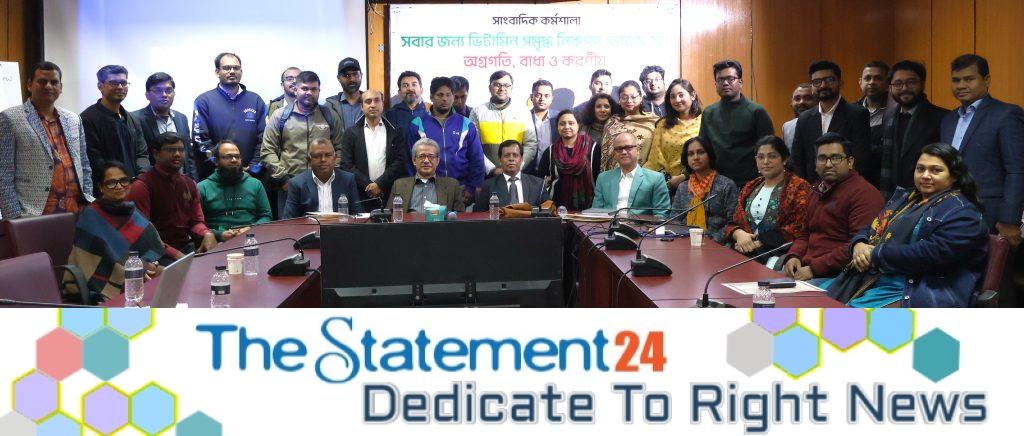
Ensuring the access to vitamin-fortified safe edible oil for all is a must to safeguard public health. According to the National Micronutrient Survey 2011-12, every one out of five pre-school aged children suffers from Vitamin ‘A’ deficiency while every two out of five children suffer from Vitamin ‘D’ deficiency. In order to deal with the precarious situation, the government has already formulated and implemented the Vitamin ‘A’ Fortification in Edible Oil Act. However, bulk edible oil marketed in drums is still working as a hindrance to ensuring the proper implementation of the law. Panelists have shared these views today at a two-day workshop for journalists titled “Safe Vitamin Fortified Edible Oil for All: Progress, Challenges, and Way Forward”, held at the BMA Bhaban in Dhaka on 23-24 January 2024. The workshop was jointly organized by the research and advocacy organization PROGGA (Knowledge for Progress) and the National Heart Foundation of Bangladesh. 26 journalists from print, television, and online media houses participated in the workshop.
It was informed at the workshop that marketing edible oil without Vitamin ‘A’ fortification is a punishable offense. In addition, selling edible oil in packaging or containers made of harmful elements is also legally prohibited. According to research conducted by ICDDR, B in 2017, 65% of the total edible oil sold in Bangladesh is marketed in drums, of which, 59% does not contain any degree of vitamin-A fortification and 34% is poorly fortified. Only 7% of the bulk oil sold in drums meets the standard as per the law.
Speakers said that bulk edible oil is distributed using drums that are manufactured with non-food-graded materials and are used for storing chemicals, lubricant/Mobil or other products. That is why, loose oil sold in drums is severely unhealthy and is prone to adulteration. Besides, these old drums do not contain any label or required information about their source, which compromises the traceability of the oil supplier and hampers the proper implementation of the law. Such unhealthy edible oil leaves people vulnerable to developing various noncommunicable diseases (NCDs).
Moreover, it was informed that the marketing of edible oil in drums should be stopped as per government instructions. Upon identifying the harmful effects of loose edible oil sold in drums, the Ministry of Industry (MoInd) issued an executive order to phase out bulk soyabean oil sold in drums by July 2022 and bulk palm oil sold in drums by December 2022. However, this order is yet to be effectively implemented. The sale of bulk edible oil in drums must be phased out according to the government order. To ensure that consumers can access safe edible oil (packaged complying with the proper standards), the Food Safety Act, the BSTI Ordinance, the Consumers’ Right Protection Act, the Packaged Food Labelling Act, etc. should be effectively implemented with coordination between the Ministry of Industry, BSTI, the Directorate of National Consumers’ Right Protection, Bangladesh Food Safety Authority and similar concerned authorities. People must be made aware to avoid unhealthy loose edible oil. Simultaneously, necessary steps must be taken for Vitamin ‘D fortification of edible oil to tackle the outbreak of noncommunicable diseases (NCD) in the country. Vitamin ‘A’ deficiency causes physiological issues like blindness, maternal death during pregnancy, etc. while Vitamin D deficiency causes Rickets as well as increases the chances of developing heart diseases, high blood pressure, diabetes, and other noncommunicable diseases (NCDs).
Mr. Reazul Haque, Deputy Director (CM), Bangladesh Standards and Testing Institution (BSTI); Ashek Mahfuz, Portfolio Lead for Large Scale Food Fortification (LSFF) and Value Chain, Global Alliance for Improved Nutrition (GAIN); Mr. Md. Shafiqul Islam, Business In-charge, Bangla Tribune and ABM Zubair, Executive Director of PROGGA were present at the event as discussants. The key presentations were delivered by Abu Ahmed Shamim, Associate Scientist, James P Grant School of Public Health; Mustak Hassan Md. Iftekhar (former Additional Secretary), Consultant, Dr. Rina Rani Paul, Program Manager, Large Scale Food Fortification (LSFF) Country Advocacy Bangladesh, National Heart Foundation Hospital & Research Institute and Md Hasan Shahriar, Head of Programs, PROGGA.

